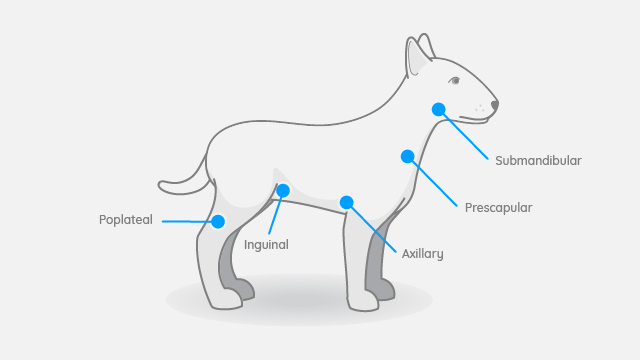A C

Global Veterinary
Communication Software Vic 9999 AU
0422 999 191
support@vetcheck.it

Lymphoma
A common blood cancer that occurs in dogs
Overview
Lymphoma is one of the most common blood cancers diagnosed in dogs. There are two types of lymphoma - T cell and B cell tumors. B cell tumors are the most common and tend to respond better to treatment than T cell tumors.
Breeds commonly affected:
- Boxer
- German Shepherd
- Poodle
- Scottish Terrier
- Golden Retriever
Signs
The most common clinical sign is the development of multiple enlarged lymph nodes. Dogs can appear the same or unwell. It is a rapidly progressive disease and without treatment, unfortunately, a dog can die within a month of diagnosis.
Commonly affected sites:
- Lymph nodes
- Liver
- Spleen
- Mucocutaneous
- Central nervous system
- Bone
Lymph node staging

| Stage I | single enlarged lymph node |
| Stage II | multiple enlarged nodes on either the front half or back half of the body |
| Stage III | multiple enlarged nodes on both front and back of the body |
| Stage IV | liver and/or spleen involvement |
| Stage V | bone marrow or other organs (gastrointestinal, skin, nervous) involvement |
Management
As lymphoma is caused by a white blood cell disorder, it can occur anywhere in the body and treatment cannot be treated surgically.
Treatment options include:
- Prednisone
- Chemotherapy
- A combination of cyclophosphamide, doxirubicin, vincristine, prednisone (CHOP)
- A combination of vincristine, cyclophosphamide, prednisone, doxorubicin, and L-asparaginase (VELCAP protocol)
- Monoclonal antibody therapy
- +/- bone marrow transplantation
- +/- radiation therapy
- Lymphoma vaccine
Chemotherapy may involve the use of multiple chemotherapy drugs over a period of months.
Chemotherapy and radiation therapy are the treatments of choice for dogs with B-cell lymphoma. Fortunately, 80-90% of dogs with B-cell lymphoma will respond successfully to chemotherapy. The dog is then confirmed, "in remission", with remission in 84% of dogs lasting around 9 months. Unfortunately, most dogs will experience a relapse in the future.
T-cell lymphoma tends to be less responsive to therapy with shorter survival times.
Prognosis
Dogs that are sick or have a T-cell lymphoma have a lower chance of remission and if they reach remission, it is shorter than the remission of a healthy dog with B-cell lymphoma.
The mean survival time for dogs treated with prednisone alone is around 2 months.
The results for chemotherapy are highly variable with a mean survival time averaging 1 year.
CHOP and VELCAP protocols have a mean survival time of around 1 year.
Studies suggest that about 10-25% of dogs will live for 2 years or longer.
References
Zemann B, Moore AS, et al. A combination chemotherapy protocol (VELCAP-L) for dogs with lymphoma. J Vet Internal Med 12 465-470, 1998.
Moore AS, Cotter SM et al. Evaluation of a discontinuous treatment protocol (VELCAP-S) for canine lymphoma. J Vet Internal Med 15 348-354, 2001
Moore AS, London CA, et al. Lomustine (CCNU) for the treatment of relapsed lymphoma in dogs. J Vet Internal Med 13 395-398, 1999.
Morrison-Collister KE, Rassnick KM, Northrup NC, Kristal O, Chretin JD, Williams LE, Cotter SM, Moore AS. A combination chemotherapy protocol with MOPP and CCNU consolidation (Tufts VELCAP-SC) for the treatment of canine lymphoma. Veterinary and Comparative Oncology 1, 180-190, 2004
Rassnick KM, Mauldin GE, Al-Sarraf R, Mauldin GN, Moore AS, and Mooney SC. MOPP chemotherapy for treatment of resistant lymphoma in dogs: a retrospective study of 117 cases (1989-2000) J Vet Internal Med 16, 576-580, 2002.